- Home
- Aaron Polson
A Feast of Flesh: Tales of Zombies, Monsters, and Demons Page 3
A Feast of Flesh: Tales of Zombies, Monsters, and Demons Read online
Page 3
He looked at the moon for a moment, and I caught the shine shimmer off the whites around his eyes. “No, I’m not done yet. The whole world has gone to hell.” He flashed around, hurried up the hill to the side of the building, and tumbled inside the rectangular entrance left by the broken window.
I cupped one hand against my mouth and called down the hill. “Dan!” He stopped about thirty yards away, turned, and moved toward me.
“What? Where the hell is Davin?”
I pointed to the church.
“That little bastard,” Dan said and strode uphill.
Shotgun blasts rocked from inside the church. Dan passed me and paused at the side of the building. All I had was the moonlight, but some of the glass glistened a bit, wet with what I confused for oil or some of that grease in the old barrel. Dan and I kicked in the rest of the window, hopped inside, and found our buddy reloading his shotgun, his face covered in a mix of sweat and blood.
“Fucking bullshit, all of it.” He raised the shotgun again, pointing at the large windows opposite us. Five more shots in rapid succession rocked the inside of the chapel, shattered the windows, and brought years of dust and debris raining from above. Sheets of bright glass cascaded to the floor.
Dan placed his hand on Davin’s shoulder. “C’mon, man. Let’s get out of here.”
I backed away, ready to flee, afraid of being trapped inside. Surely the noise would bring the dead. My ears still rang with the recent display of firepower, but my eyes jerked to a noise—a snarling, moaning wail from outside the window. I glanced outside and saw a small group of meat bags shambling towards us. Five of them—fifty yards away.
“Guys…”
Davin shrugged away from Dan and rushed to the window. “It’s about time,” he muttered. He knocked out the remnants of the window with the butt of his gun and sprang outside. “Bring it, you bastards,” he hollered, charging down the slope. The dead responded, lurching toward him, moths to a fire. He hadn’t reloaded his shotgun, but hurried toward the ghouls with it raised like a club.
Dan pushed me aside and started out of the window. As I followed, my pounding heart choked the breath from my chest.
Shadows danced in front of us. Davin howled—not pain, but pleasure. He screamed like a berserker, a mad warrior in his final fight. The stock of his gun smashed through a few skulls; one head came completely off. Dan raised his gun, trying for a clear shot, but cursed under his breath. It was over before we were close enough to help.
Davin knelt, panting, in the midst of five ruined bodies. He managed to bludgeon each into submission, a pile of grey flesh like rotten logs. His clothing, arms, and face were caked with zombie sludge, blood, mud—all except two streaks trailing from his eyes down either cheek.
“That…was..fun,” he breathed. His eyes met mine, sparkling in the moonlight. He held up his left arm, leaning on the shotgun like a crutch with his right. A red gash cut across the forearm where one of the things bit into his skin. “That last little bastard got me…”
I looked at Dan. His face flushed white. “No…”
“You gotta do it, fellas. I’m toast.” Davin shook his head. “What a way to go, huh?” He grinned, white teeth flashing from a mask of blood and offal.
“No.” Dan dropped his gun. “I can’t.”
Davin looked at me. My hands trembled around the gun. I pushed the stock into my shoulder. The trigger was cold against my finger.
“Do it.”
Davin’s body toppled backward with the thunder.
I looked away, ashamed to fear the blood and a little worried some more rot-bags smelled the fresh blood or heard the shot and would swarm the place. Dan didn’t move for a few minutes; he just hunched on grass and stared at Davin’s body. The moonlight filtered through a few drifting clouds, casting a somber pall of blue over the scene while the wind whispered across the jagged tops of nearby trees. After a minute, I heard this sob, starting low like a moan. I clutched my shotgun with white knuckles and turned to Dan. He was crying.
“Stupid bastard. Stupid, fucking bastard.” He drew one foot back as if to kick Davin’s body but stopped, rubbing a sleeve across his face. “We gotta get him outta here,” he said, almost choking on the words.
I looked back at the corpse. His face was ruined, but in my mind’s eye I saw Davin as he was alive. I saw his cockeyed smile and confident flicker in his eye. I knew what would happen if we carried him back to the compound.
“We can’t take him back.”
“What?”
I thought of Mom; the last time I saw her they doused her with fuel, dropped their torches, and her skin cracked and blackened, sending an angry plume of black snaking into the sky. Maybe the booze did it, worked on my stomach and my brain, but I knew we couldn’t bury him out here—the zombies would make a meal of his remains before the day was out. We couldn’t take him back with us either. “I’m not letting those paranoid bastards make a little bonfire of his body. He didn’t want that.”
“Are you nuts?” Dan slumped into a pew. “Those rot-bags will chew him up if we don’t.” Silence filled the little church before he spoke again. “What the hell do you want to do, stuff him in one of those damn grease barrels?”
I reached for Davin’s gun. The stock was battered now, blotted with dried blood and mud, but I could make out the groove Davin had carved with his knife. I counted thirteen older marks from his father and grandfather. Five more tallies for the dead at our feet would make nineteen. That gun had been his grandfather’s, passed down for generations.
“No, we send him out right.”
Dan helped me drag a few pews into a pile, and then I turned over a little table at the center of our kindling. Dan was stronger than me, so he hoisted Davin’s body over his shoulders, lugged him to the front of the church, and laid him out on the table. I pried open our remaining jar of booze and doused his body with it. It tasted like shit, so I knew it was strong enough to burn well. Poking my hand in my jeans, I fished around for the lighter, Dad’s old thing with the initials engraved on the side.
I snapped the lighter open against my leg. With a quick flick of my thumb a small flame lurched toward the dark ceiling of the church, and I touched the fire to the edge of the table, watching it explode as a magnificent pyre fit for our friend.
We stood outside the building for a while, chased back by the heat. I wanted to wait until every beam in the church blackened, devoured by the orange fire, and collapsed on itself. Dan and I were silent. The world was silent. As the fire melted into an ash pile, we turned and stumbled down the hill. On our way back to the wall, I glanced off into the sunrise. We spotted a zombie, a lanky thing stumbling away from us down a quiet street—he hadn’t come with the others, and how many more shambled about in the darkness I would never know. It faced the other way and didn’t see us. Dan raised his gun but hesitated. “Aw hell,” he muttered as he dropped the gun.
Behind the zombie, the eastern sky started to balloon with pinks and oranges, and I took it in, trying to memorize the look of the morning sun cresting a hill. You couldn’t see a sunrise like that in the compound. I realized that the rest of my life would be spent behind the wall, and understood why Davin had charged headlong into the arms of the dead. At that moment, I feared the stifling closeness inside more than the few pathetic, undead bastards that littered the fly-over country.
Former Vocations
I.
Something is rotten in my garden.
It was once a man;
his name dangles from
a broken tag on a torn shirt,
a green shirt
from the organic grocery
on the corner.
A vegetarian,
perhaps a vegan?
But now, it
shambles in grey impatience,
snapping its broken-toothed jaw,
dripping strings of
pestilent saliva,
groaning for
the meat
o
n my bones.
II.
Last summer,
the man brought an audience to
their feet, roaring
for Mark Antony’s revenge--
but the plague
let loose the
dogs of war,
the once-human watchers
of his theatrical game;
his friends, his neighbors, his audience,
fell upon him
chomping and snatching
at scraps of his skin,
rending and tearing
as if to take inside
some bit of the words
he brought to life.
III.
When she taught third grade,
the fence was to keep
the children in,
and she filled their
hungry brains.
Now, she is the worm’s concubine;
her fingers
drape the chain-links,
her flesh hangs in
loose strips,
her eyes
milked-over with cataracts
as she hungers for the
little ones.
But she--it--
is on the outside
and the hunger
is different.
Insatiable.
Foul.
Only slowed by the fence,
never stopping.
Never stopping.
IV.
Walled in her basement studio,
blind eyes staring--
a sort of painter’s block.
Before, when they surprised her at the sink,
the freshly-rinsed brushes
made poor defense
against jaws and fingernails.
Now she gnaws on the canvas,
Pthalo blue smears with
dried brown of human blood.
Too stupid to work the doorknob
with hands torn off at the wrist,
she flails and flails.
Her fluids strike the walls,
an homage to Jackson Pollack.
V.
Old and worn-out.
Retired.
He sat in the rocker on his wide porch,
watching
the first waves stumble and spill
down the street--
a monster of a mob,
all hands and teeth.
Too tired or slow,
he watched them break neighbors’ windows.
Deaf, he barely heard their cries
(the railroad took his ears).
He muttered through the dentures,
(he never said much, anyway).
Sans ears, sans teeth,
he still had eyes
to watch as they shambled up his steps
and took the rest of him
in gulping bites.
The Distillery
The tenement had been a whiskey distillery before the war, but the immigrants poured from steamships, fresh meat from Ireland and Eastern Europe, and they needed housing. Factory rooms were divided, and walls of grey wood thrown together. One became two, two became four, until the building folded in upon itself and became a black maze, choked with the reeking flesh of the poor.
In his fifth floor apartment, Tommy held the small, mewling child in his rough hands. It was his baby—a little girl. Her mother was dead, lost during childbirth, and the small apartment reeked of blood and sweat. The smell blended with other odors—the stench of rot and disease, fever and death. With his daughter in his hands, Tommy’s throat constricted as his eyebrows squeezed together.
“You’ll be havin’ to run, Tommy-boy,” croaked the midwife, a diminutive wrinkle of a woman in a soiled dress. “I’m sure they heard your wife’s cries. They’ll smell the blood, the death, and be on her.”
“Not my Lillian,” he choked. “God, not her.”
“Tommy, for the baby, you’ll be havin’ to run.” The midwife took the infant from his awkward grasp and sponged her pink skin with a rag from a bucket, the water almost as dark as the floor although Tommy had lugged it from the courtyard pump not an hour ago.
Tommy’s face tightened, his eyes wet and lost. “I’ll fight the bastards ‘fore I let them take my Lillian.” Both hands, filthy with the week’s dirt and his wife’s blood, squeezed into stone-like fists. He ignored the hunger that gnawed at the fringe of his consciousness, imagining the man-things that even now crept toward his door.
Sounds echoed in the hallway, shaking through the very brick and wood around Tommy’s small apartment. They were coming. The quarantine held for nearly two weeks, and the survivors that were left in The Points were desperate. The city cast off the healthy as well as the diseased. They were the worst, the Grey Men, and they had come for Lilian’s body.
In the Distillery, it was too easy to forget one’s humanity.
“Tommy go, ‘fore tis too late. You know they’ll take the baby, too—she’s not a chance here. The convent at forty-third and fifth avenue, if you can get past the barricades.” The small woman shoved Tommy’s child, now swaddled tightly in a blanket, into his waiting arm. She took up her sewing shears—the pair she’d used to cut the baby’s umbilical cord—and pressed the handles into Tommy’s other hand. “Go, now—”
A sharp rapping shook the door on its hinges. Tommy, not much more than a child himself despite his thick, black hair and broad frame, clutched the infant to his chest and pushed the shears into the waistband of his pants.
Voices hissed on the other side of the door, muttering low and indistinct, planning and scheming, and the pounding started again. Tommy slipped into the space next to the door and looked back at the squashed woman who delivered his baby as Lillian died.
Thanks, he mouthed. She nodded.
With a heavy crack, the door buckled. A second battering tore the door from its hinges, and it swung inward. Two of them spilled in, their flesh faded as old linen, black veins breaking their faces into awkward jigsaws—victims of the fever become monsters. The Grey Men would have meat.
Only two, Tommy thought. Only two and they haven’t seen me.
“Where’s the dead one?” snarled a tall, balding man-thing with ragged remnants of a beard. His tongue lolled out and slipped over his cracked lips. “Move, woman.”
The midwife folded her arms and stepped in front of the mattress and Lillian’s body. Her eyes flicked to the door and Tommy, only for a moment, but a moment too long. The Grey Men turned their heads just as Tommy squeezed past into the dim hallway.
“What’s the bundle?” the bald ghoul muttered, his hand, raw and chapped, grasped toward Tommy.
Tommy tucked the infant under his arm and scurried into the black hallway. The quickest stairwell was to the right, but they spilled after him, blocking that route, so Tommy was committed to the left. He sprinted as well as he could, his heart clanging away in rhythm with his light footfalls. The fifth floor hallways were generally clear, never as cluttered as the stifled mess below. Occasional beams of amber gaslight or the pale glow of a lantern leaked under a door, but otherwise Tommy moved in darkness. He pulled up, knowing the end of the hallway and the stairs were just ahead.
Tommy listened. Only small voices, muffled in their rooms, broke the stillness. A sharp cry cracked through the dark, and then fell silent. The midwife was dead now. The Grey Men would kill when provoked. No heavy footsteps, though. They weren’t coming. Not yet. But the stairwell before him was smashed between the second and third floors. He faced the prospect of crossing the Distillery on a lower floor, through an unfamiliar hallway, to return to the opposite stairwell and escape.
He swallowed hard, glanced down at the sleeping child swaddled in the crook of his arm, and pushed open the stairwell door.
The heat caught him first, followed by the stench: the awful reek of fouled skin, diseased flesh, urine, and feces. The stairwells at either end of the Distillery seemed to be the incubating ground for every rotten odor in the place. His face, al
ready damp from the rush through the hallway, broke out in more tiny beads of sweat, rivulets that skirted into his eyes and down his cheeks.
He started down, descending uneven steps through near darkness. If one were to find him there, open either door below, he would be trapped. Tommy brushed his damp face with the back of his free arm, and held his breath.
The fever had come without warning, burning through the Distillery and other tenements in The Points neighborhood, infecting all but a misfortunate few. The healthy became outcasts—those who had no place in the new order. Rushed barricades blocked neighborhoods such as The Points, crowded ghettos with citizens whose mouths spoke dozens of languages and whose skins reflected myriad hues between the faded milk-white of Tommy’s Lilian, to the sun-hardened leather of the Italians. Food became scarce after the barricades.
The baby, Lilian had said before labor, was a miracle. A precious gift born in a hive of human rot.
Tommy held the child close to his chest as his feet lit on the last landing before the stairwell became impassable. Third floor, he thought. The core of the Distillery. Hundreds of rooms above, hundreds below. A dark maze. He knew the trip through the heart of the building would be more perilous than his quick flight on the fifth floor. As those in the building sickened, they consolidated their numbers below, and the third floor corridor would be stifled with bodies.
He shrugged off a growing ache—the first sign that the fever had begun its work—and pressed through the doorway separating the humid stairwell and the nightmare hallway. At first, Tommy imagined the place was completely without light, but his eyes adjusted enough to make out misshapen lumps—bodies, surely—littering the narrow path. They were groaning, some asking for water, others food. Instinctively, he tightened the grip on his daughter chest.
God, let me get her to safety.
At the far end of the hallway a shadow moved. Two floors above, the door to the stairwell clicked shut. Tommy pressed the door closed on his level, compelled on by who—what—started down the stairs. He pushed his feet forward, forcing them into the empty spaces between shifting bodies. Twice he felt a damp, boney grip snatch at his legs. Tommy kept walking.

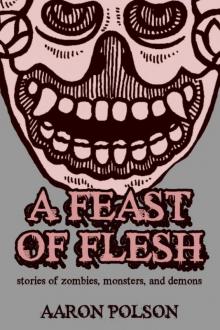 A Feast of Flesh: Tales of Zombies, Monsters, and Demons
A Feast of Flesh: Tales of Zombies, Monsters, and Demons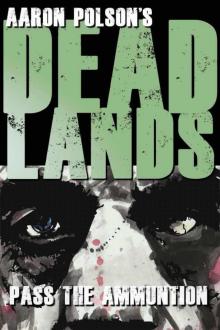 Dead Lands Pass the Ammunition
Dead Lands Pass the Ammunition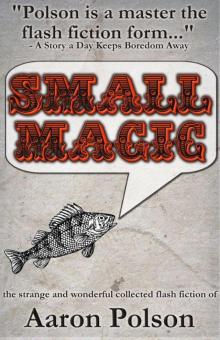 Small Magic Collected Short Stories
Small Magic Collected Short Stories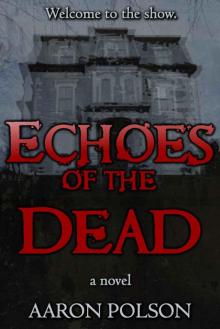 Echoes of the Dead
Echoes of the Dead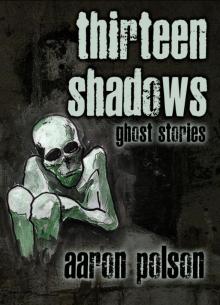 Thirteen Shadows: Ghost Stories
Thirteen Shadows: Ghost Stories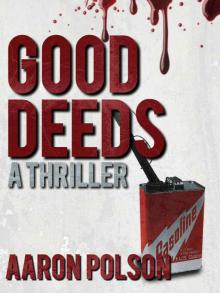 Good Deeds: A Thriller
Good Deeds: A Thriller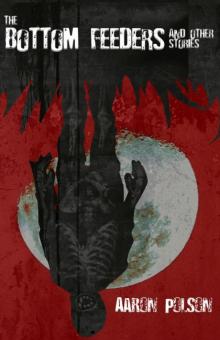 The Bottom Feeders and Other Stories
The Bottom Feeders and Other Stories